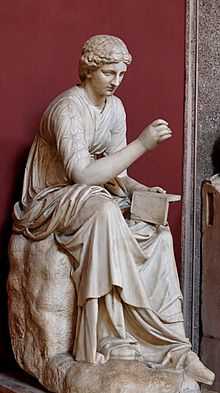Vor Arneths Grab, WAB 53
| Vor Arneths Grab | |
|---|---|
| by Anton Bruckner | |
|
Calliope, muse of elegy | |
| Key | F minor |
| Catalogue | WAB 53 |
| Form | Elegy |
| Language | German |
| Composed | 1854 – St. Florian Abbey |
| Dedication | Funeral of Prior Michael Arneth |
| Vocal | TTBB choir |
| Instrumental | 3 trombones |
Vor Arneths Grab (Facing Arneth's tomb), WAB 53, is an elegy composed by Anton Bruckner in 1854, for men's voices and trombones. Brucker wrote in 1861 a second version, Am Grabe (At the grave), WAB 2, for men's voices a cappella.
History
Bruckner composed the elegy for the funeral of Michael Arneth, the prior of the St. Florian Abbey. The work, which was written together with the Libera me, WAB 22,[1] was performed on 28 March 1854 at the cemetery of the abbey. [2] The original manuscript is stored in the archive of Wels.[2]
The elegy was performed a second time for the funeral of Magistrate Wilhelm Schiedermayr on 23 September 1855.[2]
Vor Arneths Grab were first published in band II/2, pp. 184-188 of the Göllerich/Auer biography.[2] It is put in Band XXIII/2, No. 9 of the Gesamtausgabe.[3]
A revised, 21-bar long, a cappella setting (Am Grabe, WAB 2) was performed on the funeral of Josephine Hafferl on 11 February 1861. This setting discarded the fourth strophe. The voice score of the first two strophes is identical to that of Vor Arneths Grab. The setting of the third strophe is 5-bar longer.[4] The song, which was edited first by Josef Venantius von Wöß in 1924,[4] is put in Band XXIII/2, No. 13 of the Gesamtausgabe.[3]
Text and music
The elegy is using a text by Ernst von Marinelli.
Brüder, trocknet eure Zähren, |
Brothers, dry your tears, |
The 28-bar-long work in F minor is scored for TTTB choir and 3 trombones. The setting of the first two strophes (bars 1 to 8) is identical. It is followed (bars 9 to 16) by the setting of the third strophe, and, after two instrumental bars, ends (bars 19 to 28) with the setting of the last strophe.[2]
Although it is a funeral song, it displays little of the mournful character one might expect. The text and the music, with largely diatonic harmony and a predominance of major sonorities, focus instead on confidence about resurrection and salvation. Like the concomitant Libera me, the work contains portents of Bruckner's mature style and has thus a significant place in Bruckner's musical development.[5]
Discography
There are two recordings of Vor Arneths Grab:
- Jürgen Jürgens, Monteverdi-Chor, Bruckner - Music of St Florian Period (II) - CD: BSVD-0111 (Bruckner Archive), 1984
- Thomas Kerbl, Chorvereinigung Bruckner 08, Anton Bruckner Männerchöre – CD: LIVA 027, 2008
There is no commercial recording of the full setting of Am Grabe.
References
- ↑ C. Howie, Chapter II, p. 10
- ↑ 2.0 2.1 2.2 2.3 2.4 C. van Zwol, p. 722
- ↑ 3.0 3.1 Gesamtausgabe – Weltliche Chöre
- ↑ 4.0 4.1 C. van Zwol, p. 723
- ↑ K.W. Kinder, pp. 23-25
Sources
- Keith William Kinder, The Wind and Wind-Chorus Music of Anton Bruckner, Greenwood Press, Westport, Connecticut, 2000
- Anton Bruckner – Sämtliche Werke, Band XXIII/2: Secular choruses (1843–1893), Musikwissenschaftlicher Verlag der Internationalen Bruckner-Gesellschaft, Angela Pachovsky and Anton Reinthaler (Editor), Vienna, 1989
- Cornelis van Zwol, Anton Bruckner 1824–1896 – Leven en werken, uitg. Thoth, Bussum, Netherlands, 2012. ISBN 978-90-6868-590-9
- Crawford Howie, Anton Bruckner - A documentary biography, online revised edition
External links
- Vor Arneths Grab f-Moll, WAB 53 and Am Grabe f-Moll, WAB 2 Critical discography by Hans Roelofs (German)
